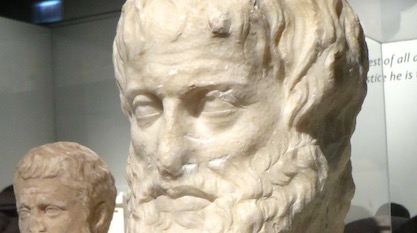 Evolution
Evolution
Aristotle and Universal Darwinism


There’s a peculiar attraction to Darwin’s theory for the modern materialist mind. And it’s not just restricted to materialists; there are theists who revere Darwinism, and there seems of late to be quite an effort — just when Darwin’s flame is dwindling in biology — to apply Darwinian theory to all manner of science — not just to biology, but to physics, cosmology, linguistics, social sciences, etc. Universal Darwinism, which I wrote about here last week, is all the rage.
Why? What is the appeal of Universal Darwinism? There’s an interesting answer, and it provides insight into what Darwinism really means to us in modern times. Darwinism is, in its most general sense, a theory of adaptive change. It explains adaptation as selection on a landscape of possibilities. The Darwinian view is that nature presents a landscape of possible solutions — phenotypes which correspond to genotypes — to adaptive problems, and reality selects certain solutions, and rejects others. Nature as we experience it is the current iteration of that eternal selection on a landscape of possibilities.
A Metaphysical Theory
As a theory of change, Darwinism is a metaphysical theory, not really a theory in natural science. A scientific theory is a specific and inherently unlikely model to which nature adheres. Newton’s law of gravitation, for example, is a very specific relation between mass, distance, and gravitational force. Out of context, it is highly unlikely that gravity would be proportional to the inverse square of distance and to the product of the masses. Why not the inverse cube and the sum of the masses? Yet, Newton was right. Einstein’s equations of the metric tensor have no logical or metaphysical necessity — many different differential equations arise from tensor calculus. Yet Einstein’s equations describe spacetime accurately. Schrödinger’s equation in quantum mechanics isn’t logically or metaphysically necessary, yet it predicts subatomic behavior to the 14th decimal place. A good theory in natural science is a logically unlikely relationship in nature, that turns out to be right. A likely or logically necessary relationship isn’t natural science. It’s metaphysics or a tautology.
Darwinism is not logically unlikely. Survivors are quite likely to survive. Actuality indeed arises from possibilities. Adaptation is quite likely to arise from selection on a landscape of possibilities. One may even say that adaptation is defined as selection for survival (i.e., adaptation) on a landscape of possibilities.
Relations in nature that are logically likely or even necessary are metaphysical theories, not scientific theories. Darwinism is a metaphysical proposition: adaptation in nature is the consequence of selection on a landscape of possibilities. That’s why it can be applied to so many different sciences — it’s metaphysics, not biology.
Potency and Act
Is Darwinism good metaphysics? Well, it’s certainly not new metaphysics. It’s a riff on very old metaphysics. Readers familiar with classical philosophy will recognize a theme cloaked in Universal Darwinism — Aristotle’s theory of potency and act.
Aristotle proposed that change in nature can be understood as the actualization of potency. Substances (e.g., living things) are a composite of act (what they actually are) and potency (what they might be). When a thing changes — an acorn becomes an oak tree, for example—the potency in an acorn (to become an oak tree) is actualized.
Aristotelian potency can be understood as a landscape of possibilities (potency), on which selection (Aristotelian efficient cause) actualizes adaptations (act). “Universal Darwinism” is just a bastardization of classical Aristotelian potency and act as a metaphysical framework for change in nature.
A Poor Shadow
As you might imagine, Darwinists who explicitly credit Aristotle as the basis for their knock-off “theory” are vanishingly few. Most Darwinists don’t know metaphysics from metaphors, and imagine that they have made a profound scientific discovery. But Universal Darwinism is neither scientific (it’s metaphysics) or a discovery (it’s just a sloppy recapitulation of Aristotle’s hylomorphic metaphysics).
And of course Universal Darwinism is a poor shadow of Aristotle’s metaphysics of potency and act. Aristotle observed that potency and act were the more general manifestation of matter and form. Potency is the individuated “matter” out of which reality is made, and form is the intelligible principle by which matter becomes actual. Aristotle’s theory of potency and act is a profound insight into the fabric of reality. Universal Darwinism is a pale imitation of Aristotle’s profound metaphysical insight.
Why then do Darwinists hawk “Universal Darwinism” — which is just an impoverished version of Aristotelian metaphysics? A couple of reasons come to mind:
- Aristotelian potency and act are indeed a good framework with which to understand nature. Darwinists don’t have a clue about Aristotle, but they do have the vague sense that selection acting on a landscape of potentialities is a real insight. It is, but it’s not their insight, and the genuine insight is much more profound than they imagine.
- Universal Darwinism, as a doppelgänger of genuine Aristotelian metaphysics, provides third rate scientists and third rate philosophers with faux respectability and a pretty good income stream. Why should great discoveries be restricted to great thinkers?
Aristotle’s Prime Mover
But there’s a deeper reason for expropriating Aristotle’s metaphysics in the service of materialism and atheism — which Aristotle would have found ignorant and abhorrent. Aristotle’s theory of potency and act is the basis for the first logically irrefutable demonstration of God’s existence. Aristotle’s Prime Mover argument is a logical conclusion of his metaphysics, and it remains the cornerstone of philosophical demonstrations of God’s existence. St. Thomas Aquinas borrowed it for his First Way, and he believed the argument to be logically tightest one for God’s existence.
The greatest engine of atheism in modern times — Darwin’s theory — is nothing more than a bastardization of the strongest philosophical argument for God’s existence. What an irony. Those who do understand what Darwinism really means are, no doubt, smiling.
Photo: Bust of Aristotle, by Eden, Janine and Jim, via Flickr (cropped).
